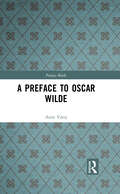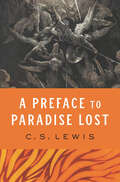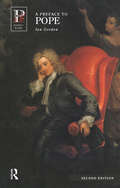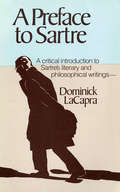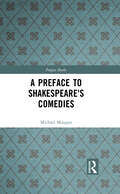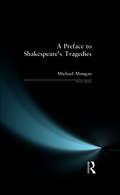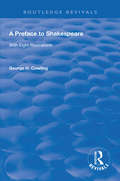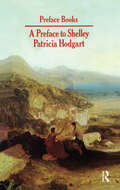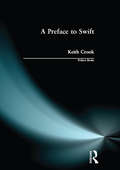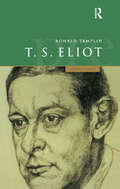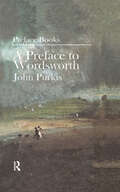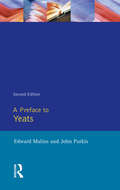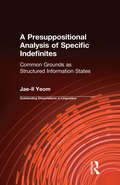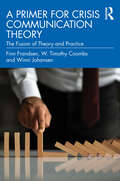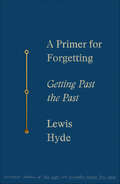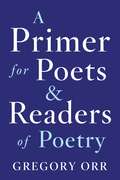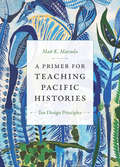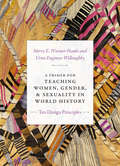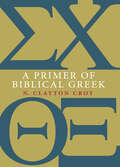- Table View
- List View
A Preface to Oscar Wilde (Preface Books)
by Anne VartyA Preface to Oscar Wilde provides a detailed study of the cultural, personal and political influences that shaped Wilde's writing. The study concentrates primarily on his fiction, critical dialogues and plays that were published between 1890 and 1895, and detailed accounts of Wilde's lesser known works such as his poetry, journalism and letters are also presented. The first section places his work in a variety of cultural contexts: Wilde's family life and his Irish inheritance are examined, the impact of his sexuality on his writing and reputation is considered, and a description is provided of how Wilde became a legendary figure in the arts. Major innovations and successes, such as The Picture of Dorian Gray, Salome and The Importance of Being Earnest are related to avant garde movements of their day such as aestheticism, decadence, and symbolism. Reference sections provide supporting material such as a Wilde chronology, a glossary of terms and a bibliography for further study. Anne Varty sets out in this study to bring to life the work of Wilde, and to make his writing accessible to readers who are unfamiliar with his achievements. In so doing, she confronts the ethical drive of his work, and demonstrates the coherent evolution of his work from the aestheticism of the early poetry, through the sophisticated handling of theatre, to the dark self-scrutiny of autobiography. The comprehensive and accessible approach makes this a useful reference work to all who are studying Oscar Wilde, both at A Level and undergraduate level. The content will also appeal to the general reader who is seeking to gain a greater understanding and appreciation of Wilde's work.
A Preface to Oscar Wilde (Preface Books)
by Anne VartyA Preface to Oscar Wilde provides a detailed study of the cultural, personal and political influences that shaped Wilde's writing. The study concentrates primarily on his fiction, critical dialogues and plays that were published between 1890 and 1895, and detailed accounts of Wilde's lesser known works such as his poetry, journalism and letters are also presented. The first section places his work in a variety of cultural contexts: Wilde's family life and his Irish inheritance are examined, the impact of his sexuality on his writing and reputation is considered, and a description is provided of how Wilde became a legendary figure in the arts. Major innovations and successes, such as The Picture of Dorian Gray, Salome and The Importance of Being Earnest are related to avant garde movements of their day such as aestheticism, decadence, and symbolism. Reference sections provide supporting material such as a Wilde chronology, a glossary of terms and a bibliography for further study. Anne Varty sets out in this study to bring to life the work of Wilde, and to make his writing accessible to readers who are unfamiliar with his achievements. In so doing, she confronts the ethical drive of his work, and demonstrates the coherent evolution of his work from the aestheticism of the early poetry, through the sophisticated handling of theatre, to the dark self-scrutiny of autobiography. The comprehensive and accessible approach makes this a useful reference work to all who are studying Oscar Wilde, both at A Level and undergraduate level. The content will also appeal to the general reader who is seeking to gain a greater understanding and appreciation of Wilde's work.
A Preface to Paradise Lost
by C. S. LewisC. S. Lewis’s illuminating reflections on Milton’s Paradise Lost, the seminal classic that profoundly influenced Christian thought as well as Lewis’s own.In Preface to Paradise Lost, the Christian apologist and revered scholar and professor of literature closely examines the style, content, structure, and themes of Milton’s masterpiece, a retelling of the biblical story of the Fall of Humankind, Satan’s temptation, and the expulsion of Adam and Eve from the Garden of Eden. Considering the story within the context of the Western literary tradition, Lewis offers invaluable insights into Paradise Lost and the nature of literature itself, unveiling the poem’s beauty and its wisdom.Lewis explains and defends the literary form known as “Epic,” pondering simple yet perceptive questions such as: What is an Epic? Why, in the seventeenth century, did Milton choose to write his story in this style? In what sense is Paradise Lost similar to the Homeric poems or the Anglo Saxon Beowulf? In what sense did Milton develop Virgil’s legacy? With the clarity of thought and style that are the hallmarks of his writing, Lewis provides answers with a lucidity and lightness that deepens our understanding of this literary form and both illuminates Milton’s immortal epic and its meaning and inspires readers to revisit it. Ultimately, he reminds us why elements including ritual, splendor, and joy deserve to exist and hold a sacred place in human life. One of Lewis’s most revered scholarly works, Preface to Paradise Lost is indispensable for literature, philosophy, and religion scholars and for ardent fans of Lewis’s writings.
A Preface to Pope (Preface Books)
by Ian Robert GordonThis second edition of Ian Gordon's A Preface to Pope places the poet within the social, cultural and intellectual context of his time. It throws new light on the theoretical and imaginative structures of Pope's poetry focusing on the linguistic complexity at its centre. It offers a critical survey of his work and also contains introductory essays. The book concludes with a reference section which includes indispensible information on places and people in Pope's poetry, together with a glossary of technical terms and a guide to further reading.
A Preface to Sartre
by Dominick LaCapraPerhaps the leading Western intellectual of his time, Jean-Paul Sartre has written highly influential works in a diverse number of subject areas: philosophy, literature, biography, autobiography, and the theory of history. The concise and lucidly-written A Preface to Sartre discusses the French philosopher's contributions in all of these fields.Making imaginative use of the insights of some of the most important contemporary French thinkers (notably Jacques Derrida), Dominick LaCapra seeks to bring about an active confrontation between Sartre and his critics in terms that transcend the opposition between existentialism and structuralism. Referring wherever appropriate to important events in Sartre's life, he illuminates such difficult works as Being and Nothingness and the Critique of Dialectical Reason, and places Sartre in relation to the traditions that he has explicitly rejected. LaCapra also offers close and sensitive interpretations of Nausea, of the autobiography, The Words, and of Sartre's biographical studies of Baudelaire, Genet, and Flaubert."I envision intellectual history," writes laCapra, "as a critical, informed, and stimulating conversation with the past through the medium of the texts of major thinkers. Who else in our recent past is a more fascinating interlocutor than Sartre?"
A Preface to Shakespeare's Comedies (Preface Books)
by Michael ManganThis is an informative and interesting guide to the comedies of love - The Two Gentlemen of Verona, The Taming of the Shrew, Love's Labour's Lost, A Midsummer Nights Dream, Much Ado About Nothing, As You Like it and Twelfth Night - which were written in the early part of Shakespeare's career. As well as supplying dramatic and critical analysis, this study sets the plays within their wider social and artistic context.Michael Mangan begins by considering the social function of laughter, the use of humour in drama for handling social tensions in Elizabethan and Jacobean society and the resulting expectations the audience would have had about comedy in the theatre. In the second section he discusses the individual plays in the light of recent critical and theoretical research. The useful reference section at the end gives the reader a short bibliographic guide to key historical figures relevant to a study of Shakespeare's comedies and a detailed critical bibliography.
A Preface to Shakespeare's Comedies (Preface Books)
by Michael ManganThis is an informative and interesting guide to the comedies of love - The Two Gentlemen of Verona, The Taming of the Shrew, Love's Labour's Lost, A Midsummer Nights Dream, Much Ado About Nothing, As You Like it and Twelfth Night - which were written in the early part of Shakespeare's career. As well as supplying dramatic and critical analysis, this study sets the plays within their wider social and artistic context.Michael Mangan begins by considering the social function of laughter, the use of humour in drama for handling social tensions in Elizabethan and Jacobean society and the resulting expectations the audience would have had about comedy in the theatre. In the second section he discusses the individual plays in the light of recent critical and theoretical research. The useful reference section at the end gives the reader a short bibliographic guide to key historical figures relevant to a study of Shakespeare's comedies and a detailed critical bibliography.
A Preface to Shakespeare's Tragedies (Preface Books)
by Michael ManganThis book is a study of four of Shakespeare's major tragedies - "Hamlet", "Othello", "King Lear" and "Macbeth". It looks at these plays in a variety of contexts - both in isolation and in relation to each other and to the cultural, ideological, social and political contexts which produced them.
A Preface to Shakespeare: WITH EIGHT ILLUSTRATIONS (Routledge Revivals)
by George. H. CowlingPublished in 1908, this book considers the work of William Shakespeare. Providing notes and commentaries on some of his poems and plays, as well as context from English history, and analysis from his contemporaries and successors, Jonson, Beaumont, Fletcher and Massinger, this book will be an interesting read for those interested in his work.
A Preface to Shelley (Preface Books)
by P. HodgartThis volume discusses the life and work of Percy Bysshe Shelley in the social and political context of the world and time in which he lived.
A Preface to Shelley (Preface Books)
by Patricia HodgartThis volume discusses the life and work of Percy Bysshe Shelley in the social and political context of the world and time in which he lived.
A Preface to Swift (Preface Books)
by Keith CrookJonathan Swift's moral and political satires astonished his contemporaries and still have the power to disturb, with their compelling images and unsettling turns of argument, and to delight, with their charm and inventive wit. A Preface to Swift examines the complex appeal of this fierce critic of oppression.While thematically arranged, the text follows a broadly chronological account of Swift's life to show his development as a writer from the prolific and inventive iconoclast to the mature satirist whose enduring memory of past events produced warm friendship as well as strong resentment. It considers in detail his engagement with the corruption of over-secure politicians and his opposition to the easy rationalism of free-thinking pundits. Gulliver's Travels is shown to be a coherent critique of eighteenth-century ideas of science, education and politics in which the order of the books ('the progress of the fable') is highly significant for its whole meaning. While this is a major focus, Keith Crook also discusses a wide range of Swift's other works, including his early satires, his political writings, his poems and his letters.Detailed chronological charts place his life and works in the political and cultural context, and illustrations have been chosen with commentaries to extend the reader's sense of Swift's connections with London, Ireland and his contemporaries. This will be a particularly useful introduction to students who are studying satire as a genre; the early eighteenth-century literary, scientific, philosophical and political context; the representation of women; the political relation of Ireland to England; and the position of the artist within society, especially in connection with the levers of power.
A Preface to T S Eliot (Preface Books)
by Ron TamplinT. S. Eliot is arguably the most influential poet of the 20th century, and The Waste Land one of its most significant poems. This introduction to the life and works of T.S. Eliot sets his writing clearly in the context of his times. Outlining his life and cultural background and their effect on his work, Ronald Tamplin examines his poetry and focuses in detail on three major works: The Waste Land, Four Quartets and the play, Murder in the Cathedral.
A Preface to T S Eliot (Preface Books)
by Ron TamplinT. S. Eliot is arguably the most influential poet of the 20th century, and The Waste Land one of its most significant poems. This introduction to the life and works of T.S. Eliot sets his writing clearly in the context of his times. Outlining his life and cultural background and their effect on his work, Ronald Tamplin examines his poetry and focuses in detail on three major works: The Waste Land, Four Quartets and the play, Murder in the Cathedral.
A Preface to Wordsworth: Revised Edition (Preface Books)
by John PurkisProbably the most famous of the Romantic poets, William Wordsworth worked with and influenced many of the leading poets of the age. This excellent introduction to his life and works sets his writing firmly in the context of his times. John Purkis provides an outline of Wordsworth's life and cultural background and their effect on his work, and examines his verse, from the earliest school poems to the final years.
A Preface to Wordsworth: Revised Edition (Preface Books)
by John PurkisProbably the most famous of the Romantic poets, William Wordsworth worked with and influenced many of the leading poets of the age. This excellent introduction to his life and works sets his writing firmly in the context of his times. John Purkis provides an outline of Wordsworth's life and cultural background and their effect on his work, and examines his verse, from the earliest school poems to the final years.
A Preface to Yeats (Preface Books)
by John Purkis Edward MalinsThe first edition, by the late Edward Malins, of this informative guide to the life and works of one of the most important and difficult poets of the 20th century, has now been extensively revised by John Purkis. It begins by providing biographical details on Yeats, with particular emphasis on his education, his appearance and his characteristics. It then places the poet in his cultural background, discussing the history of Ireland and major ideas which influenced his poetry. This is followed by an updated critical section which includes careful close readings of ten of his poems. The book concludes with an extensive reference section containing information about his many friends and their influence on and connection with particular poems.
A Presuppositional Analysis of Specific Indefinites: Common Grounds as Structured Information States (Outstanding Dissertations in Linguistics)
by Jae-Il YeomFirst published in 1998. In this book the author presents the view that although many linguists have been interested in specific indefinites, their theories are not quite satisfactory in that they have only tried to explore some aspects of specific indefinites. This paper assumes a standard notion of specificity, i.e., the notion of someone having-in-mind an individual or a relation. Under this assumption, there is an attempt to review previous studies on specific indefinites, and propose a new theory of specificity which I believe can capture all aspects which the previous studies have explored. This leads us to a new information theory which is partially representational and partially denotational., and which is useful for dealing with conversational aspects, like the distinction between the speaker and the audience.
A Primer for Crisis Communication Theory: The Fusion of Theory and Practice
by W. Timothy Coombs Finn Frandsen Winni JohansenGuided by a belief that good crisis communication theory should inform and improve practice, this book makes a wide range of theories utilized in crisis communication accessible to researchers, students, and practitioners.The book begins with an extended discussion of applied theory, including the theory building process, to help the reader appreciate how theory can connect to the practice of crisis communication. This discussion is followed by chapters each explaining a theory and using an evidence-based approach to explore how that theory illuminates and applies to crisis communication practice. The array of theories includes those that are descriptive, prescriptive, and critical and cover the areas of public crises, political crises, and corporate crises.This book is essential reading for advanced students of public relations and strategic communication and researchers in crisis and risk communication, with practical insights suitable for interested professionals.
A Primer for Forgetting: Getting Past the Past
by Lewis Hyde“One of our true superstars of nonfiction” (David Foster Wallace), Lewis Hyde offers a playful and inspiring defense of forgetfulness by exploring the healing effect it can have on the human psyche. We live in a culture that prizes memory—how much we can store, the quality of what’s preserved, how we might better document and retain the moments of our life while fighting off the nightmare of losing all that we have experienced. But what if forgetfulness were seen not as something to fear—be it in the form of illness or simple absentmindedness—but rather as a blessing, a balm, a path to peace and rebirth? A Primer for Forgetting is a remarkable experiment in scholarship, autobiography, and social criticism by the author of the classics The Gift and Trickster Makes This World. It forges a new vision of forgetfulness by assembling fragments of art and writing from the ancient world to the modern, weighing the potential boons forgetfulness might offer the present moment as a creative and political force. It also turns inward, using the author’s own life and memory as a canvas upon which to extol the virtues of a concept too long taken as an evil. Drawing material from Hesiod to Jorge Luis Borges to Elizabeth Bishop to Archbishop Desmond Tutu, from myths and legends to very real and recent traumas both personal and historical, A Primer for Forgetting is a unique and remarkable synthesis that only Lewis Hyde could have produced.
A Primer for Poets and Readers of Poetry
by Gregory OrrAn innovative and accessible guide to poetry-writing by an award-winning poet and beloved professor of poetry. A Primer for Poets and Readers of Poetry guides the young poet toward a deeper understanding of how poetry can function in his or her life, while also introducing the art in an exciting new way. Using such poems as Theodore Roethke’s "My Papa’s Waltz" and Robert Hayden’s "Those Winter Sundays," the Primer encourages young writers to approach their "thresholds"—those places where disorder meets order, where shaping imagination can turn language into urgent and persuasive poems. It provides the poet with more than a dozen focused writing exercises and explains essential topics such as the personal and cultural threshold; the four forces that animate poetic language (naming, singing, saying, imagining); tactics of revision; ecstasy and engagement as motives for poetry; and how to locate and learn from our personal poetic forebears.
A Primer for Teaching Pacific Histories: Ten Design Principles (Design Principles for Teaching History)
by Matt K. MatsudaA Primer for Teaching Pacific Histories is a guide for college and high school teachers who are teaching Pacific histories for the first time or for experienced teachers who want to reinvigorate their courses. It can also serve those who are training future teachers to prepare their own syllabi, as well as teachers who want to incorporate Pacific histories into their world history courses. Matt K. Matsuda offers design principles for creating syllabi that will help students navigate a wide range of topics, from settler colonialism, national liberation, and warfare to tourism, popular culture, and identity. He also discusses practical pedagogical techniques and tips, project-based assignments, digital resources, and how Pacific approaches to teaching history differ from customary Western practices. Placing the Pacific Islands at the center of analysis, Matsuda draws readers into the process of strategically designing courses that will challenge students to think critically about the interconnected histories of East Asia, Southeast Asia, Australia, the Pacific Islands, and the Americas within a global framework.
A Primer for Teaching Women, Gender, and Sexuality in World History: Ten Design Principles (Design Principles for Teaching History)
by Merry E. Wiesner-Hanks Urmi Engineer WilloughbyA Primer for Teaching Women, Gender, and Sexuality in World History is a guide for college and high school teachers who are teaching women, gender, and sexuality in history for the first time, for experienced teachers who want to reinvigorate their courses, for those who are training future teachers to prepare their own syllabi, and for teachers who want to incorporate these issues into their world history classes. Merry E. Wiesner-Hanks and Urmi Engineer Willoughby present possible course topics, themes, concepts, and approaches while offering practical advice on materials and strategies helpful for teaching courses from a global perspective in today's teaching environment for today's students. In their discussions of pedagogy, syllabus organization, fostering students' historical empathy, and connecting students with their community, Wiesner-Hanks and Willoughby draw readers into the process of strategically designing courses that will enable students to analyze gender and sexuality in history, whether their students are new to this process or hold powerful and personal commitments to the issues it raises.
A Primer of Biblical Greek (Eerdmans Language Resources (ELR))
by N. Clayton CroyThough there are currently a number of texts for teaching biblical Greek, most of them are plagued by various deficiencies. Written with these flaws in mind, this new primer by N. Clayton Croy offers an effective, single-volume introduction to biblical Greek that has proven successful in classrooms around the country.This volume takes a primarily deductive approach to teaching biblical Greek and assumes that students have no prior knowledge of the language. Divided into 32 separate lessons, each containing a generous number of exercises, the text leads students from the Greek alphabet to a working understanding of the language of the Septuagint and the New Testament.Special features of A Primer of Biblical Greek:An abundance of exercisesEach lesson includes practice sentences taken from the Septuagint and the New Testament as well as Greek sentences composed by the author. Exercises in English-to-Greek translation are also included.Concise but accurate grammatical explanationsGreat care has been taken to insure that grammatical explanations are clear, correct, and succinct. In particular, the Greek participle receives a fuller-than-usual treatment.A natural order of presentationMaterial is presented according to the natural structure of Greek and the traditional terminology of grammarians. Declensions and principal parts, for example, are presented in numerical order.Inclusive languageThe book uses inclusive language for human beings throughout.Helpful appendixes for quick referenceIncluded at the back of the book are the Greek paradigms, Greek-to-English vocabulary, English-to-Greek vocabulary, and a bibliography for further study.
